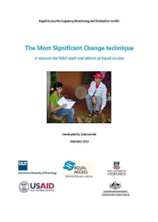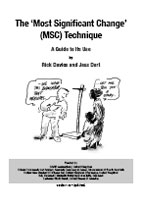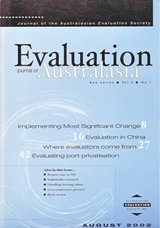Danish/dansk frontpage
Most
Significant Changes (MSC)
and
Quarterly Monitoring Chart (QMC)
This page focuses on the MSC approach for monitoring. Additionally you can find descriptions of a simple planning tool, QMC, as developed by Mellemfolkeligt Samvirke and its partner organisations.

An online bibliography about the Most Significant Change Technique
Prepared by Rick Davies. Click on the picture to access webpage.

The Most Significant Change Technique
Manual from the Equal Access Network, 2011
The manual is based on the manual below.
It is shorter and drawing on a research project in Nepal.
Click on the picture to download the manual as an PDF file

Rick Davies and Jess Dart: The 'Most Significant Change' (MSC) Technique
A Guide to Its Use, Version 1.00 - April 2005 (Web published by MandE News, UK)
A comprehensive, user friendly, and hands-on treatise of experiences gained during a decade.
A must for the practitioner!
Read here: MSC Manual Link to 'MandE News': Miscellaneous
Peter Sigsgaard: Doing Away With Predetermined Indicators:
Monitoring using the Most Significant Changes Approach
in: Lucy Earle (ed.): Creativity and Constraint, INTRAC, Oxford 2004
Read here: Doing Away

an ongoing testing of the MSC approach
Evaluation Journal of Australasia, Vol. 2 (new series), No. 1, August 2002
Article; the why and how of Mellemfolkeligt Samvirke's experiments with MSC
Read here: Monitoring without
Peter Sigsgaard: MSC Pilot Report MS-Zambia 2001
The Most Significant Change exercise was undertaken as a pilot by MS-Denmark in collaboration with MS-Zambia in late April to early May 2001. The exercise aimed at assessing the workability and appropriateness of the approach as an alternative and/or supplementary monitoring and evaluation tool. Ten partners were visited in Southern and Eastern Provinces of Zambia (see annex I). These included community based organisation, district council, national non-governmental Organisations, civil society
Read the draft report here: MSC Pilot Report Zambia
Peter Sigsgaard: Impact Monitoring Without Indicators. MSC Pilot Study in Mozambique
June 2001Another pilot exercise undertaken by MS-Denmark.
Read the draft report here: Impact Monitoring Without Indicators
Claudia Fontes (with support from Ricardo Wilson-Grau and Rick Davies):
How do you DOEN? Stories from the culture sector in
The DOEN Foundation, The Netherlands, August 2010
A thorough use of the MSC approach in an evaluation of an extensive international culture programme. The stories are used for constructing relevant domains of change and theories highlighting the developmental impact of the activities.
I bring here the report and annexes by courtesy of the consultant Claudia Fontes and the Dutch organisation DOEN Foundation.
Read the report here: How do you DOEN?
Annexes: A: List of participants C: MSC stories D: D-MS Selection and analysis
 Videotaped MSC stories 2010
Videotaped MSC stories 2010Mellemfolkeligt Samvirke/Action Aid in Central America have used the MSC method for annual partnership and programme reviews.
Click on the picture to see some examples.
Robyn Keriger: MSC Guide: Based on the Experience of ADRA Laos
ADRA Laos & ADRA Australia, 2004 (published via download)
A very inspiring manual. According to a later evaluation, this pilot MSC was a success. Below you can also get a rather large file of this evaluation.
Read manual here: MSC Guide ADRA Download evaluation: ADRA
Rebecca Wrigley: Learning from Capacity Building Practice:
Adapting the 'Most Significant Change' Approach to Evaluate Capacity Building Provision by CABUNGO in Malawi
Praxix Paper No. 12, INTRAC, Oxford, December 2006
An interesting attempt to use MSC for evaluation purposes
Read here: CABUNGO
Bettina Ringsing: Learning about advocacy. Monitoring as a tool for learning in Ibis South America
MSc Thesis, Wageningen University, The Netherlands, August 2003
This investigation explores MSC as a tool for monitoring an NGO's advocacy endeavours.
Read here: MSC Advocacy
Adan Kabelo, Peter Sigsgaard, Charlton Sulwe: Toolkit for TTT M&E. MSiS 2004-2005
MS Travelling Topic Team on M&E, 'Manual' for Mellemfolkeligt Samvirke, Copenhagen 2004
Internal "How-to-do-it" introductory guide for in-house training in the MSC technique and planning by using the QMC (Quarterly Monitoring Chart).
Read here: TTT Toolkit
Peter Sigsgaard: Advocacy Example QMC
Hypothetical case outlining planning for Advocacy interventions, manus., 2005
This example was constructed on demand for a QMC addressing more "soft" interventions areas than e.g. construction of water tanks etc.
Read here: Advocacy QMC
Peter
Sigsgaard
Mosevangen
48 DK-3460 Birkeröd
Denmark